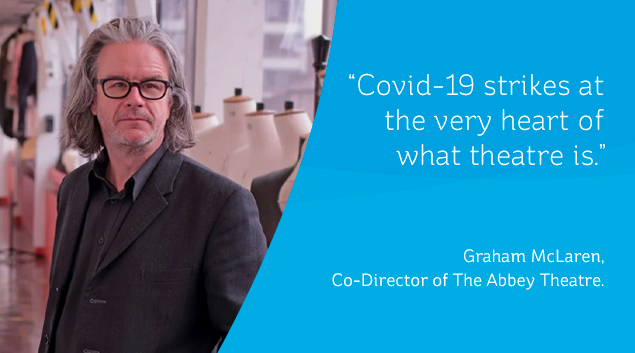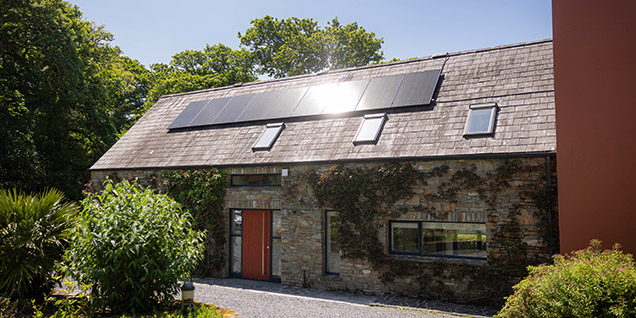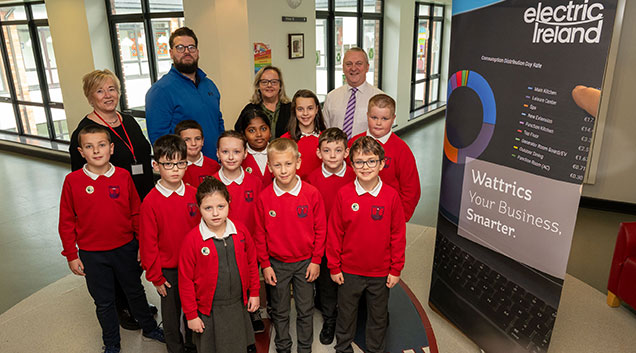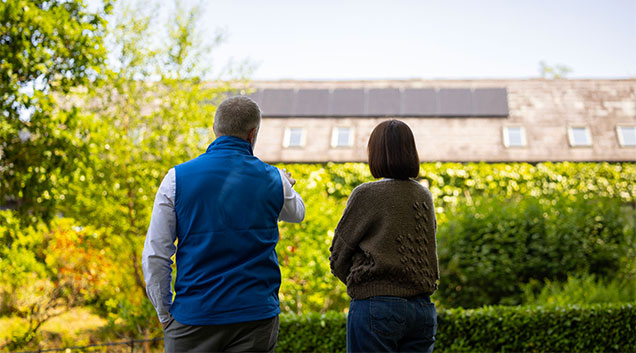Keeping the show on the road
The Covid-19 and lockdown restrictions have impacted many businesses, industries and social activities. The arts world has been seriously impacted, and theatre in particular. Imagine Romeo and Juliet without a kiss. Or Dancing at Lughnasa where the sisters don’t hug and cry on each other’s shoulders. Or a production without an audience.
Around the world, theatres have been scaling back or even closing. In order to survive in this new world, theatres need to embrace change, innovate by utilising technology and harness the skills and dedication of staff and artists.

“Theatre has been uniquely affected by Covid19 and restrictions . We wanted to discover how businesses in other industries have adapted to these new ways of working”, says Graham McLaren, joint Director and CEO of the Abbey Theatre.
“Quite early in the lockdown I said that the world may be changing but the Abbey’s function must not change. Its job is to tell Ireland’s story to Ireland. The way in which we do it may be different, but our job must be the same.” Says McLaren
The Abbey is leading the way with “Dear Ireland”, which is an initiative that brings the voices of 100 artists together in order to provoke a creative conversation with the nation.
“We commissioned writers to each write a monologue, to be performed by 50 actors, and then streamed on ourYouTube channel, writers were mostly Ireland based with the addition of three writers located in New York, Italy and China. Each writer nominated one actor to perform their piece, and the actors were self-taping their performances from social isolation.” says McLaren.
Creative conversation
McLaren is keen to stress that the Abbey Theatre is more than the walls which house its productions. The Abbey is artist-led and audience-focused, and reflects the challenges being faced by Irish society.
In addition to making new art by documenting this unprecedented time artistically, the aim was to support theatre makers financially who have been greatly impacted by the closure, cancellation or postponement of many artistic projects.
“Dear Ireland” came about 48 hours into lockdown when it occurred to me very starkly that the artists we worked with would literally have no money. I called my co-Director Neil Murray and we started dreaming and planning. We spent the first week calling around to the theatre makers involved with our own projects that were postponed or cancelled, saying we were going to honour their contracts. Then we approached 50 playwrights and commissioned them to write a letter to Ireland. It was primarily about funding artists, but we were then able to create really interesting and timely works of art that the nation can keep forever more.” says McLaren.
Technology played a large part, working with digital partner ZOO Digital, the theatre had to transform 50 recordings into four productions streamed over four evenings in April.
“Actors are no strangers to self-recording on their laptops or their phones and sending those in for audition, but often those are 30 second snippets,” says McLaren. “So we took that technology and expanded it. To do that with one or two people would have been a tall order, but to do it with 50 – essentially 50 little plays – and turn it around in five weeks was something else.” says McLaren
It was also innovative. McLaren references Apple’s Steve Jobs who said that “creativity is just connecting things, seeing something obvious that others don’t see and acting on it”.
“We were the first company that started working on this digital venture. The idea has now been replicated in other countries, for example Dear Australia just launched using the Abbey’s model,” he says. “We have had an extraordinary amount of positive feedback on the initiative. Of course, it is flattering to have others replicate our idea. That is a sign that it is working, but to have the audience members themselves writing or spontaneously donating money to the organisation is fantastic.”
While the idea might have been obvious, McLaren knows that it is not a replacement for the communal experience. However, the theatre is continuing to experiment with ideas and formats.
Age of distance
In response to the desire for connection in an age of distance, the Abbey is offering its audience an opportunity to participate in the next iteration of the project by writing their own letter to Ireland. 20 of these letters will be selected and performed by some of Ireland’s leading actors on the Abbey stage later this year and broadcast digitally for theatre lovers around the world to experience.
The theatre is also understood to be looking at hosting a blend of live work for a socially distanced audience outdoors as well as more digital work using platforms such as Zoom and bespoke OTT services. Innovation is now a hallmark of a theatre that has survived and thrived through a century of change.
“The experience over lockdown has been transformative,” says McLaren. “The Abbey Theatre has weathered Spanish flu, it has weathered civil war, it has weathered world wars, it has weathered fires and each time it has managed to continue and come back stronger. I think that is partly to do with the fact that the Abbey Theatre is not just a building, it is the ethos at the heart of it. It is the people who work here.
“Through innovation we have learned to collaborate in a new way and colleagues have come together with a single clear purpose and there isn’t a doubt in my mind that the Abbey Theatre is at the very top of the tree in world theatre right now.” says McLaren.



